South Korean President Yoon Suk Yeol’s government lifted martial law early Wednesday, ending a dramatic night of political tension during which troops surrounded the parliament and lawmakers voted to oppose military rule.
Yoon announced that military personnel were withdrawn after a bipartisan parliamentary vote rejected the imposition of martial law. The measure was officially rescinded during a Cabinet meeting around 4:30 a.m., concluding a six-hour period of martial law.
Why was Martial Law Declared in South Korea?
On Tuesday night, Yoon declared martial law, expressing frustration with the opposition and pledging to eliminate what he described as “anti-state” forces.
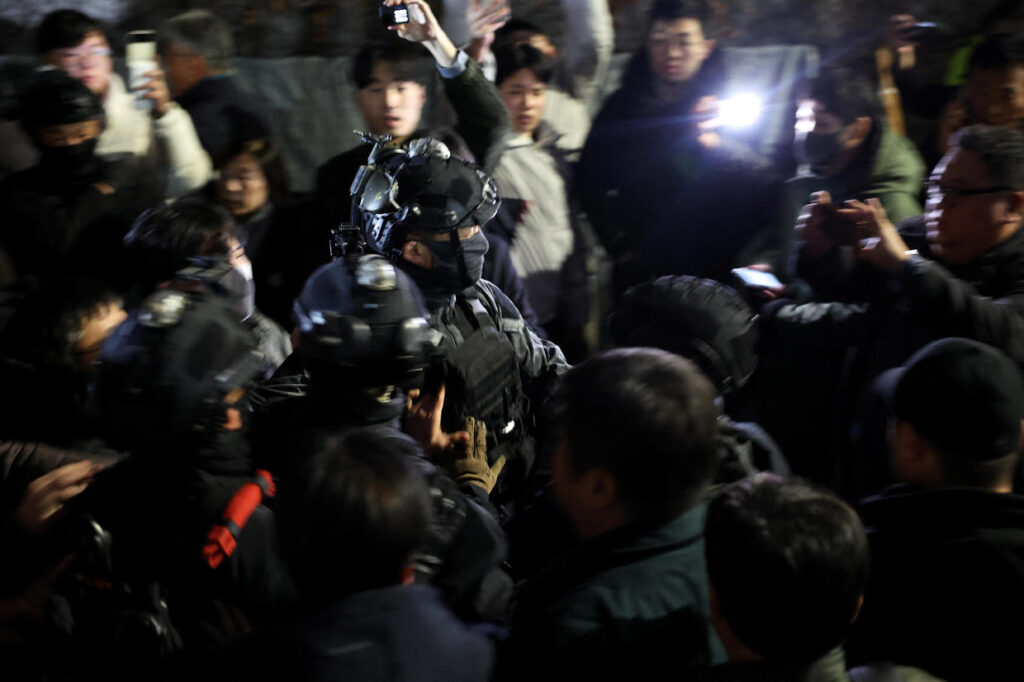
Facing strong resistance from opponents who dominate the nation’s parliament and whom he accuses of harboring sympathy for communist North Korea, Yoon made the move to consolidate control.
In a televised address, Yoon defended the decision, stating that martial law was necessary to “rebuild and safeguard” the nation from “plunging into national ruin.”
He vowed to “eradicate pro-North Korean forces” and uphold the “constitutional democratic order.”
“I will eliminate anti-state forces as quickly as possible and normalize the country,” he said, while asking the people to believe in him and tolerate “some inconveniences.”
Under South Korea’s constitution, the president is authorized to declare martial law during “wartime, war-like situations, or other comparable national emergencies” that necessitate military intervention to maintain peace and order.
However, whether South Korea is currently in such a state is debatable.
When martial law is enacted, “special measures” may be implemented, including restrictions on freedom of the press, freedom of assembly, and other rights, as well as limitations on judicial power.
The constitution also mandates that the president must comply if the National Assembly votes to revoke martial law by a majority decision.
Hours after the declaration, parliament voted to lift it. National Assembly Speaker Woo Won Shik stated that lawmakers “will protect democracy with the people.”
The resolution passed with 190 of the 300 members in attendance from both ruling and opposition parties, all of whom voted in favor, according to the BBC.
Following the vote, police and military personnel were seen leaving the Assembly’s grounds after Speaker Woo called for their withdrawal.
Lee Jae-myung, leader of the liberal Democratic Party, which holds the parliamentary majority, announced that party lawmakers would remain in the Assembly’s main hall until President Yoon formally rescinded the martial law order.
“Democratic Party lawmakers, including me and many others, will protect our country’s democracy and future and public safety, lives and properties, with our own lives,” Lee told reporters.
President Yoon, while announcing plans to lift martial law, intensified his criticism of parliament’s efforts to impeach senior government officials and prosecutors.
He accused lawmakers of engaging in “unscrupulous acts of legislative and budgetary manipulation that are paralyzing the functions of the state.”
Hundreds of protesters gathered outside the National Assembly, waving banners and demanding Yoon’s impeachment. Some clashed with soldiers ahead of the parliamentary vote, but no injuries or significant property damage were reported.
A window was broken during a confrontation as soldiers tried to enter the Assembly building. In one dramatic moment, a woman attempted to seize a soldier’s rifle, shouting, “Aren’t you embarrassed!”
Yoon’s controversial move evoked memories of the authoritarian era of the 1980s, drawing sharp condemnation from opposition parties and even the leader of his own conservative faction.
After Yoon’s announcement, South Korea’s military declared a suspension of parliamentary sessions and other political gatherings that could “cause social confusion,” according to Yonhap News Agency.
It also ordered striking doctors to resume work within 48 hours, warning that violators could be arrested without a warrant. Thousands of doctors have been on strike for months over the government’s plan to expand medical school admissions.
In response, the National Assembly speaker issued an emergency statement via YouTube, urging lawmakers to convene at the Assembly.
He called on military and law enforcement personnel to “remain calm and hold their positions.”
During the subsequent vote, all 190 lawmakers present supported lifting martial law. Television footage showed soldiers withdrawing from the parliament premises after the decision.
Earlier in the day, televised images revealed police blocking the National Assembly entrance, while helmeted soldiers armed with rifles stood guard.
Riot police buses and patrol cars were stationed nearby, further heightening tensions, according to the BBC.
“Open the gate, please. Your job is to protect the National Assembly. Why are you standing idly by while MPs are being trampled?” a middle-aged man shouted at a group of policemen guarding the gate.
An Associated Press photographer reported that at least three helicopters, presumably military, landed on the Assembly grounds, while two or three others circled overhead.
Han Dong-hoon, leader of Yoon’s conservative People Power Party, criticized the decision to impose martial law, calling it “wrong” and pledging to “oppose it with the people.”
Meanwhile, Lee, the opposition leader who narrowly lost to Yoon in the 2022 presidential election, condemned the announcement as “illegal and unconstitutional.”
A spokesperson for the White House National Security Council told CBS News that the Biden administration had not been informed of the martial law declaration in advance but was in communication with the South Korean government and “closely monitoring the situation.”
“We are seriously concerned by the developments we are seeing on the ground in the ROK,” the spokesperson said, referring to South Korea by its official name, the Republic of Korea.
A White House official informed CBS News that President Biden, currently on a trip to Angola, has been updated on the situation.
The United States maintains approximately 28,500 troops in South Korea to defend against threats from its nuclear-armed neighbor, North Korea.
According to Pentagon spokesman Maj. Gen. Pat Ryder, the situation has not impacted U.S. service members stationed in South Korea.
“We are watching the recent developments in the ROK with grave concern,” U.S. Deputy Secretary of State Kurt Campbell said. “We have every hope and expectation that any political disputes will be resolved peacefully and in accordance with the rule of law.”
Yoon, whose approval ratings have declined in recent months, has faced significant challenges in advancing his agenda due to an opposition-controlled parliament since taking office in 2022.
Tensions have escalated as Yoon’s party remains deadlocked with the liberal opposition over next year’s budget bill.
Meanwhile, the opposition has attempted to impeach three top prosecutors, including the head of the Seoul Central District Prosecutors’ Office.
Conservatives have condemned these efforts as retaliation for ongoing criminal investigations into Lee, widely regarded as a leading contender for the 2027 presidential election according to recent polls.
Yoon has also faced backlash for rejecting calls for independent probes into scandals involving his wife and senior officials, prompting swift and fierce criticism from his political adversaries.
In response to Yoon’s announcement, the Democratic Party reportedly convened an emergency meeting of its lawmakers.
This marks the first declaration of martial law in South Korea since the nation’s democratization in 1987, and the first instance of such a measure since October 1979.
(CBS)
Follow the Parallel Facts channel on WhatsApp: https://whatsapp.com/channel/0029VaCQSAoHgZWiDjR3Kn2E



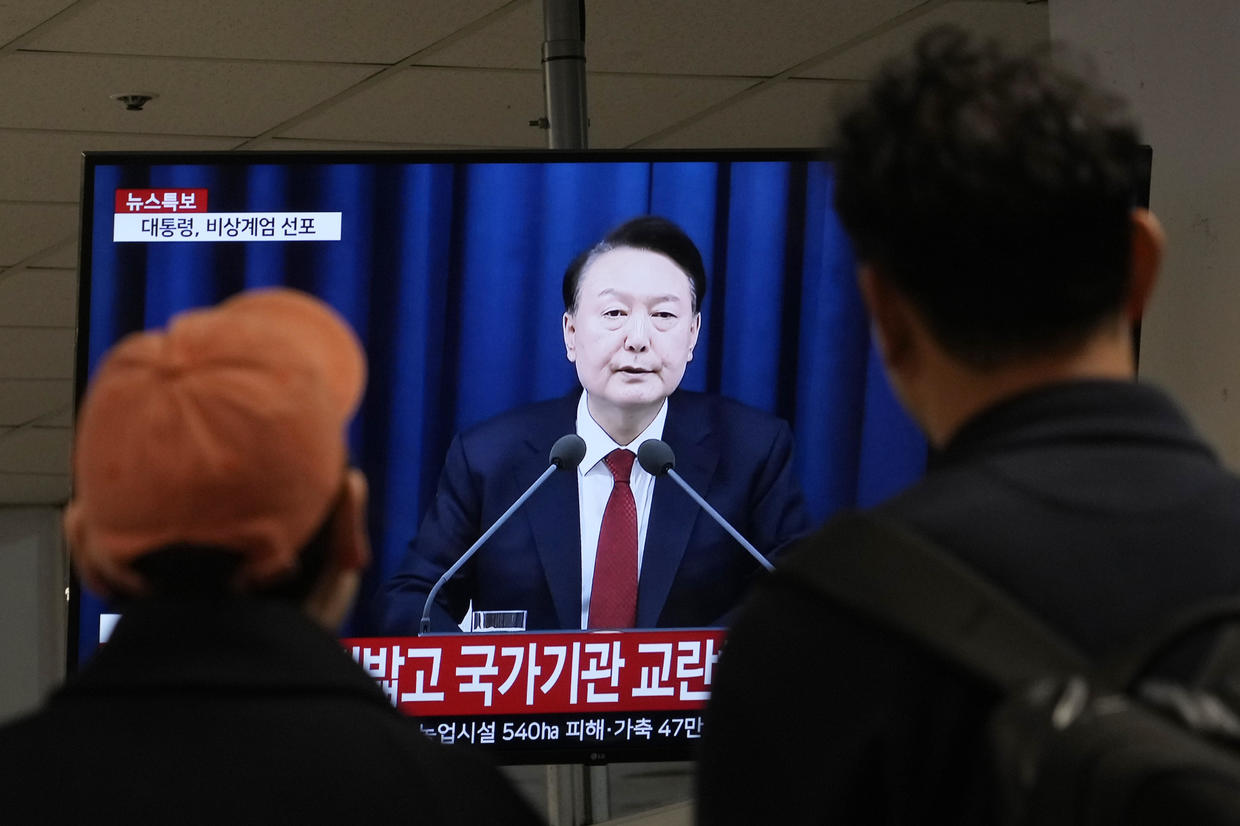
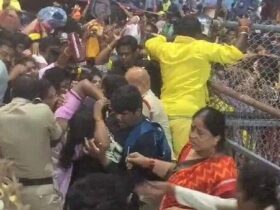
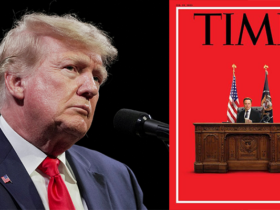
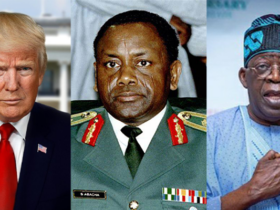
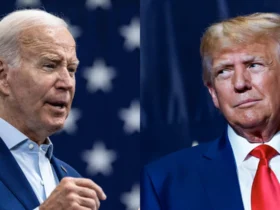
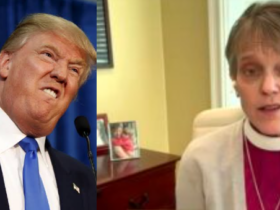
Leave a Reply